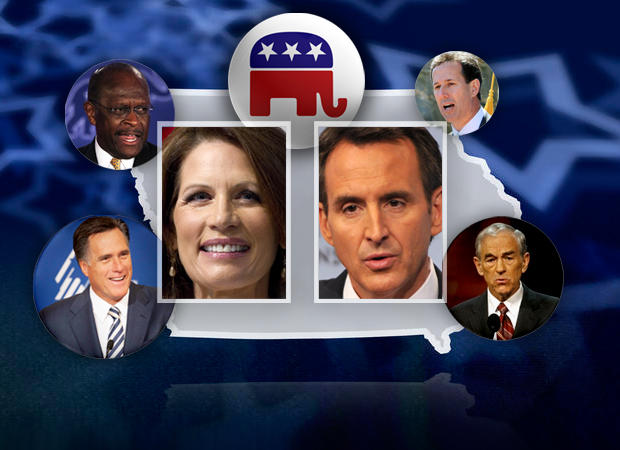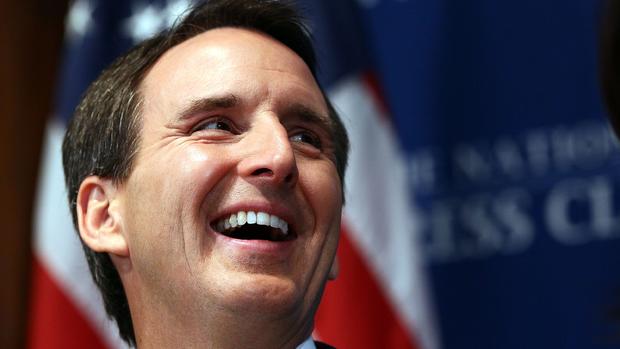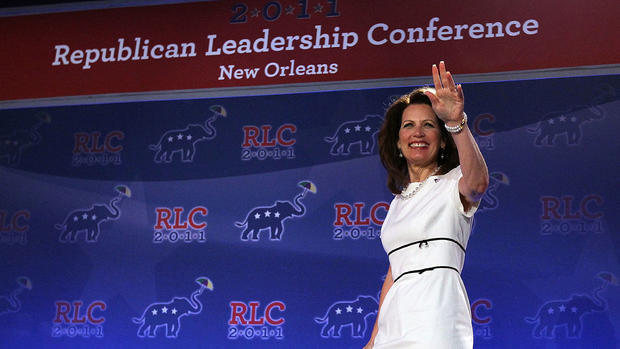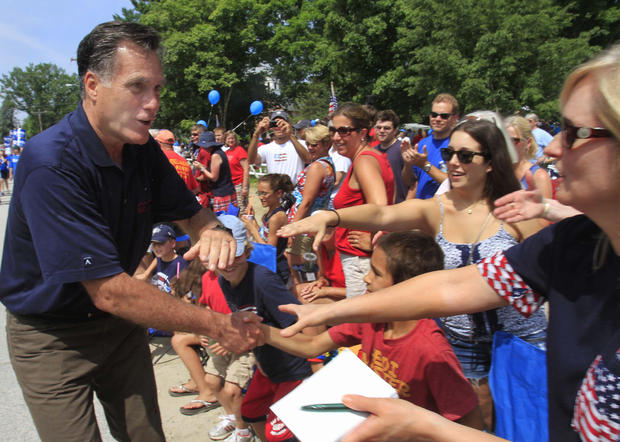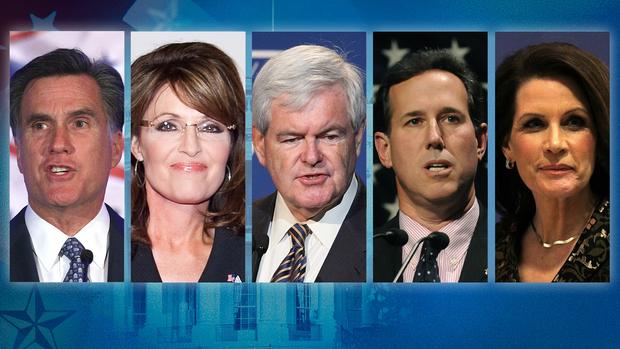In Iowa, GOP contenders in high-stakes battle for straw poll victory
AMES, Iowa - To understand the Iowa straw poll, which takes place on the campus of Iowa State University here on Saturday, you first have to understand that the event is, well, something of a fraud.
The straw poll is taken very seriously by the media and the Republican establishment: It's seen as a sign of which Republican candidate is connecting with Iowa voters, and thus which candidate has the best chance to win the crucial Iowa caucuses - the first in-the-nation contest that, in turn, is seen as a marker of who will win their party's nomination.
Yet the straw poll game is rigged: Candidates pay the $30 entry fee for their supporters to attend, bus them in for the event, and offer them free food and entertainment. In other words, votes are bought, so they don't necessarily tell us much. In the 2008 cycle, for example, Mitt Romney spent lavishly to buy a straw poll win, then went on to lose the caucuses to the under-funded Mike Huckabee. It's worth noting that, although the candidates give speeches at the straw poll Saturday afternoon, no one really expects them to make a difference - which is why voting begins before the speeches do.
The Iowa Republican Party - for which the straw poll doubles as a lucrative fundraiser - will tell you that the caucuses matter because they demonstrate which campaign can best mobilize its supporters. Because Iowa is a caucus state, the argument goes, organization is particularly important - it translates into supporters actually showing up at their caucus.
And that's true. But so what? Just as the straw poll isn't necessarily a predictor of the outcome of the caucuses, the caucuses aren't necessarily a predictor of the winner of the nomination. (Just ask Huckabee.) Particularly in a cycle like this, when the well-funded Romney appears poised to implement a grind-it-out strategy that is not dependent on victories in the early states, a caucus victory may well turn out to be a mere footnote in the larger story of the race. It's worth noting that the Democratic Party, having concluded that straw polls are a waste of time and money, strongly discourages them, and they hold no corresponding event in Iowa.
CBSNews.com special report: Election 2012
And finally, consider this: Romney won the straw poll with just 4,516 votes in the 2008 cycle, out of about 14,000 total votes. Far more people - 119,000 - voted in the caucuses, and a multiple of that - 682,000 - backed John McCain in the general election. Even putting aside the fact that votes can be bought, the straw poll -- which in many cases depends on people getting up early to drive across the state or spending hours on a bus provided by a campaign to get to the Iowa State campus -- simply isn't big enough to offer a serious glimpse into the preferences of Iowa Republicans.
Why it matters anyway
Despite all this, the straw poll matters. A lot. Why? Because politics is a game of perception. And a win in the straw poll, meaningless though it may be, can fundamentally change how a candidate is seen by the media, the Republican establishment and the donors who make or break a campaign.
Nobody understands this better than Tim Pawlenty. A few months ago, the former Minnesota governor was expected to emerge as the biggest threat to Romney for the nomination. Yet Pawlenty's campaign never caught fire, in part because while few Republicans seemed to dislike Pawlenty, even fewer seemed very excited about him. And Pawlenty's decision not to attack Romney on health care during the second Republican presidential debate was seen by many as a signal that he lacked what it took to win the nomination.
The result? Pawlenty never emerged from the low single digits in polls, his fundraising dried up and his campaign started looking like it might not last the summer.
Which is why Pawlenty decided to go hard after the one thing that could change the narrative: A victory in the straw poll. Pawlenty has spent more than a million dollars in Iowa and has been campaigning there virtually nonstop. He is widely seen as having the best organization in the state, and while his team is trying to manage expectations - the candidate says he merely needs to "show progress" - they know that if Pawlenty doesn't win the straw poll or finish a strong second, he may be finished.
If he wins the straw poll, Pawlenty will start getting treated by the media as a real contender for the nomination, not a second-tier player who didn't live up to the hype. And he'll be able to tell potential donors that, despite their early concerns, he has the capacity to win. If he doesn't do well? He will have missed his best opportunity to turn things around, and shown donors, and the media, that even when he goes all-in he can't come out on top.
Pawlenty's strongest rival for straw poll victory is Minnesota Rep. Michele Bachmann, the Iowa native who has been crisscrossing the state in recent days encouraging supporters to come vote for her in the straw poll. (It doesn't hurt that she can promise that her tent will offer both free barbeque and country superstar Randy Travis.) Bachmann lacks Pawlenty's organization, but she has the one thing that has been sorely lacking from his campaign: Buzz.
Because of that buzz, and because of her appeal to the social conservatives who make up the majority of the Iowa GOP electorate, Bachmann is seen by many Iowa Republicans as the frontrunner to win the straw poll. But that's not necessarily the best place for her to be. Despite her relatively strong standing in the polls, Bachmann is seen by many Republicans as something of a fringe candidate - someone who can fire up the base in certain states but lacks the national appeal to win the nomination, let alone the general election.
If Bachmann wins the straw poll, she won't change that perception all that much - but she will be able to make the case that her appeal can translate to electoral victory. If she loses, she suddenly no longer looks quite so much like the hardcore conservative's candidate of choice. Pawlenty may win the straw poll over Bachmann because he more successfully turns out his supporters, not because Iowans like him more than they do her. But the media will nonetheless cast her loss as a momentum killer.
That's why Bachmann has been focused aggressively on getting her supporters to Ames: She includes a straw poll reference in the name of her campaign events, and has released a television ad tied explicitly to the straw poll. Her campaign has also erected billboards around the state touting a movie featuring a flattering portrayal of Bachmann, and is touting the candidate's strong opposition to raising the debt limit in mailers and radio ads.
Romney, meanwhile, is going in the opposite direction - he decided to basically skip the straw poll this time around. His name is on the ballot, but he isn't making an effort to bring people to the event. That doesn't mean he isn't in Iowa this week: He held a business roundtable and a fundraiser on Wednesday, and on Thursday he will make a stop at the Iowa state fair before participating in Thursday evening's Republican presidential debate. (More on that later.) But when the other candidates spread out across the state seeking last-minute straw poll votes on Friday, he'll be skipping town.
There's a strategic reason for that: The 2008 cycle showed that Romney simply isn't a good fit in Iowa, where many voters question his conservative credentials. And since anything less than a victory would be an embarrassment for the nominal frontrunner, he has ample incentive to opt out. Romney's aides say the candidate isn't giving up on Iowa entirely - behind closed doors, his campaign is reaching out to supporters in the state, with an eye on making a serious run on at the caucuses - but for now, at least, he's decided to lie relatively low.
That's a luxury that long-shot contenders like Rick Santorum and Herman Cain can't afford. Santorum, the former Pennsylvania senator, has struggled to gain traction during his presidential run, and he's placing his bets on a better-than-expected straw poll finish to give him a boost. To that end, he's embarked on a three-week "Courage to Fight for American Values" tour through 50 cities in Iowa, accompanied by his family. His argument is that he's the best option for voters seeking a pure social conservative. Yet Santorum lacks the resources of his rivals - he's paying for supporters' tickets, but he doesn't have the money for advertising - and he faces an uphill battle.
Cain, meanwhile, at one time looked like the breakout star of the 2012 cycle - he was lauded on Fox News after the first Republican debate, and a June Des Moines Register poll showed him in third place. But Cain has faded in the polls amid a series of gaffes, and has lost much of his staff, including, crucially, his straw poll director. Cain has said he will reassess his campaign if he doesn't finish in the top three in Ames, and at this point it looks likely he will have to do so.
More likely to finish in the top three is Ron Paul, the libertarian-leaning Republican congressman with a passionate, if limited, base of support. Paul is running a more disciplined campaign this time around, one that's less about influencing the debate and more about actually being a contender - and it's worth noting he spent more than any other candidate ($31,000) for prime real estate at the straw poll. Paul is generally dismissed by the media as having virtually no chance of winning the nomination, to the extreme frustration of his supporters. That probable won't change if he finishes in the top three, or even if he wins the straw poll. But a victory would give Paul a serious boost, embarrass Bachmann and Pawlenty, and hurt the Iowa GOP - which would see its straw poll dismissed as trivial by many in the media.
Looming over all of them, meanwhile, are two people who aren't in the race, at least not yet: Rick Perry and Sarah Palin. Perry supporters have been seeking to get him write-in votes on the straw poll ballot; more importantly, the longtime Texas governor is expected to make his plans to run for president known during a speech in South Carolina on Saturday - just as the straw poll candidates are giving speeches in Ames. Perry's decision to make news Saturday will dampen coverage of the straw poll results, depriving Pawlenty or another candidate of some of the boost they would otherwise get out of a win. And on top of that, Perry - who many expect to emerge as Romney's biggest threat - will travel to Iowa on Sunday.
Meanwhile, it emerged Wednesday that Palin, the former Alaska governor and 2008 GOP vice presidential nominee, would be restarting her "One Nation" bus tour this week at the Iowa State Fair. While Palin has been out of the spotlight for most of the summer, a high-profile stop right before the straw poll will distract attention from the candidates on the straw poll ballot -- and prompt speculation over whether she will eventually jump into the race.
Before the straw poll, a debate
Amazingly, it would still be a big week for the candidates even without the straw poll: On Thursday night at 9 p.m. ET, the candidates will gather in Ames for the most significant debate of the campaign thus far. All the major players will be there (excluding not-yet-candidates Perry and Palin), and they will have an opportunity for the sort of breakout performance that boosted Cain after the first debate and Bachmann after the second. The event is particularly important for Pawlenty, who will have a second chance to draw distinctions with Romney ahead of the straw poll, and for Huntsman, who is making his debate debut. Bachmann, meanwhile, may draw fire from rivals seeking to slow her momentum.
Down the road in Des Moines, meanwhile, hundreds of thousands of Iowans will be focused on something else: The fried foods (fried butter on a stick!), carnival rides, agriculture and livestock shows and famous "butter cow" that can be found at the enormous Iowa State Fair. Most of the candidates plan to stop at the fair to speak and participate in various events on the grounds, such as serving as "guest pork chef," in an attempt to win over fair-goers without (they hope) looking too foolish in the process.
